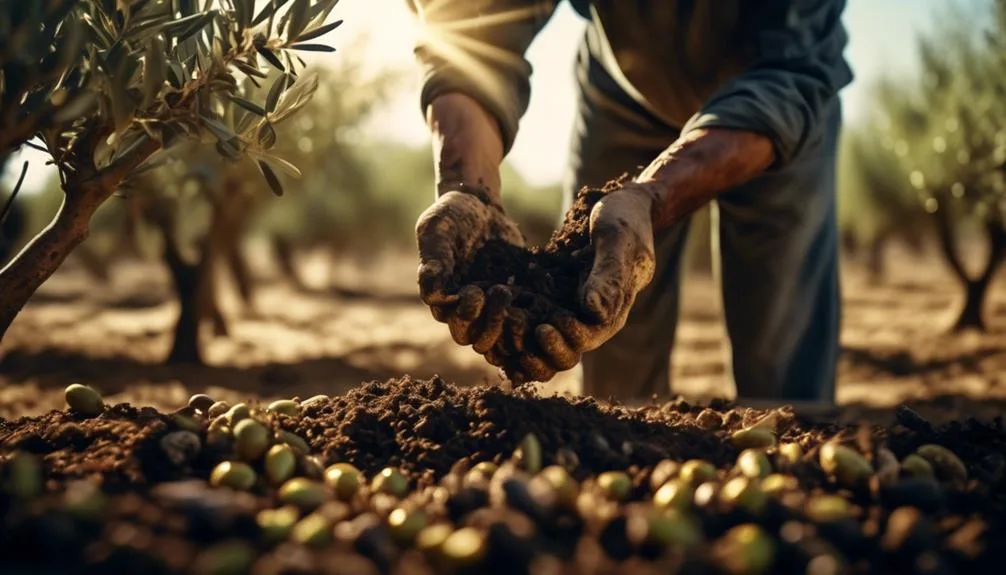If your olive trees aren't doing well, the soil might be the problem. Good soil is crucial for healthy and productive olive trees.
You can improve the soil by testing it, adjusting pH levels, and adding organic matter. These methods can make a big difference in the health and yield of your olive trees.
Follow these proven techniques to give your olive trees the best chance to thrive.
Key Takeaways
- Conduct a soil test before planting olive trees to determine pH levels, nutrient content, and texture.
- Adjust soil pH levels to ensure they are between 5.5 and 7.5 for optimal olive tree growth.
- Add organic matter such as compost or well-rotted manure to improve soil fertility and structure.
- Use mulching techniques to improve soil quality, retain moisture, and control weeds.
Soil Testing
Before planting your olive trees, it's essential to conduct a soil test to determine the soil's pH levels, nutrient content, and texture. Soil testing helps identify any nutrient deficiencies and allows you to make the necessary amendments before planting.
The composition of the soil greatly affects the growth and health of olive trees. For example, olives thrive in well-draining soil with a pH level of 6 to 8. If the soil is too acidic or alkaline, it can lead to nutrient deficiencies and poor tree growth.
Ph Adjustment
Assess the pH level of your soil to determine if adjustments are necessary for optimal olive tree growth and health. Olive trees thrive in soil with a pH level between 5.5 and 7.5. If your soil is too acidic, below 5.5, consider applying lime to raise the pH level. Lime application helps to neutralize acidity, making essential nutrients more available to the olive trees.
On the other hand, if your soil is too alkaline, above 7.5, you may need to consider incorporating acidic amendments to lower the pH level. By adjusting the pH level of your soil, you can ensure that olive trees have access to the necessary nutrients for healthy growth and robust fruit production. Regularly monitoring and maintaining the appropriate pH level in the soil is crucial for the overall well-being of your olive trees.
Organic Matter Addition
To improve the soil for your olive trees, consider adding organic matter to enhance fertility and overall soil health. Adding organic matter such as compost or well-rotted manure can significantly benefit your olive trees. Here's why:
- Composting Benefits
- Composting organic material helps create a nutrient-rich soil amendment that can enhance the overall soil structure, moisture retention, and microbial activity. This can result in improved root development and better nutrient uptake for your olive trees.
- Nutrient Breakdown
- Organic matter gradually breaks down in the soil, releasing essential nutrients such as nitrogen, phosphorus, and potassium. This natural process provides a steady supply of nutrients to the olive trees, promoting healthy growth and abundant fruit production.
Mulching Techniques
Consider using mulching techniques to improve the soil quality and support the growth of your olive trees. Mulching not only helps with moisture retention but also aids in weed control, creating a healthy environment for your olive trees to thrive. Here are different types of mulching materials and their benefits:
| Mulching Material | Benefits | Considerations |
|---|---|---|
| Organic Matter | Improves soil structure and fertility | Decomposes over time |
| Wood Chips | Insulates soil and retains moisture | May deplete nitrogen |
| Straw | Suppresses weeds and conserves moisture | Can attract pests |
Watering and Drainage
Improving the drainage around your olive trees is essential for maintaining soil health and promoting healthy growth. Proper irrigation methods are crucial to prevent soil compaction and ensure the olive trees receive adequate water without the risk of root rot.
To improve watering and drainage:
- Irrigation Methods:
- Consider drip irrigation to deliver water directly to the root zone, reducing surface runoff and promoting efficient water use.
- Install a moisture sensor to monitor soil moisture levels and avoid overwatering, which can lead to root rot.
Conclusion
Incorporating these soil improvement techniques will create an optimal environment for your olive trees to thrive.
By testing and adjusting the soil pH, adding organic matter, using mulching methods, and managing watering and drainage, you can ensure the long-term health and productivity of your olive trees.
With thoughtful soil care, you can look forward to enjoying robust and fruitful olive trees for years to come.

